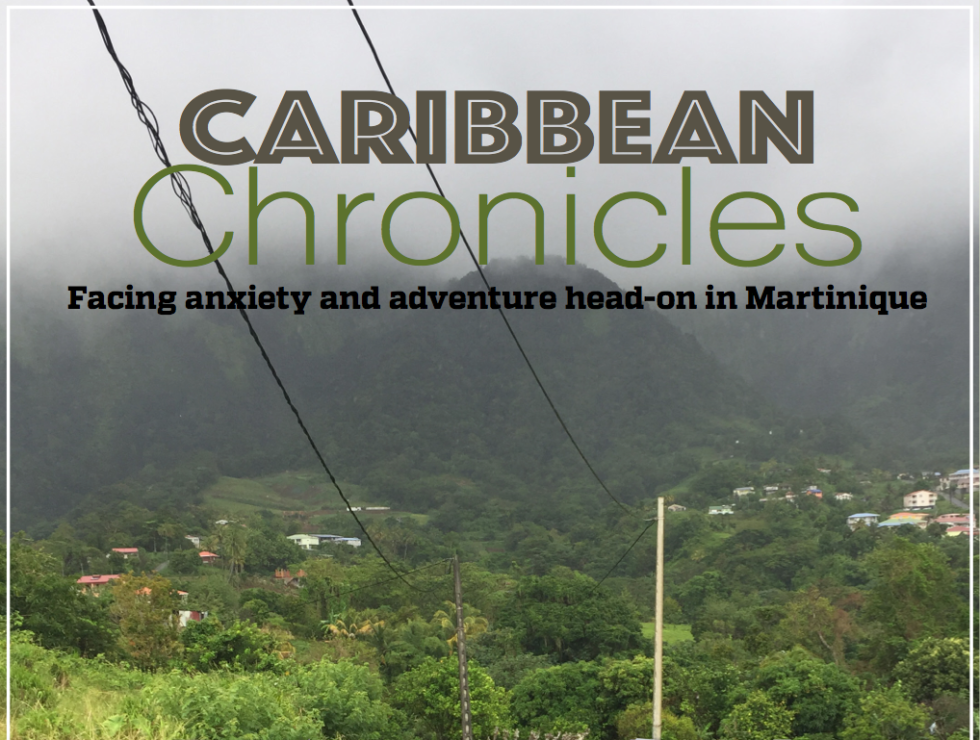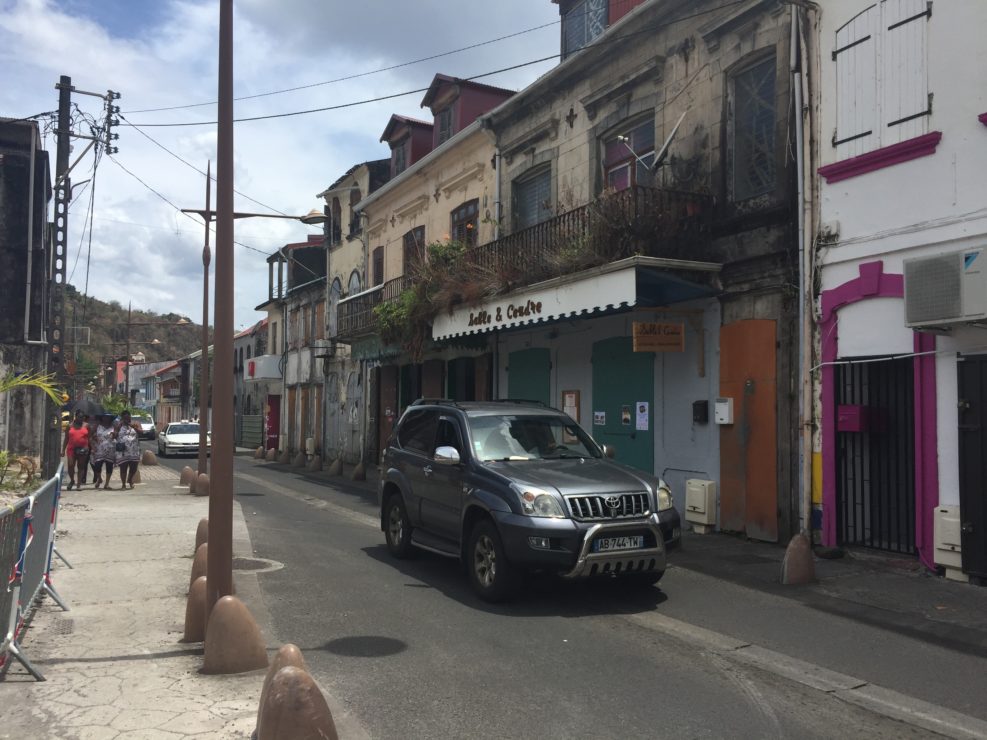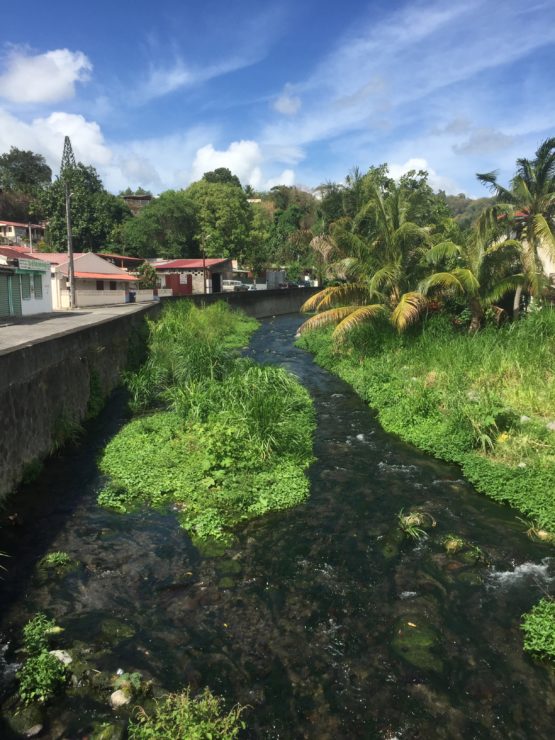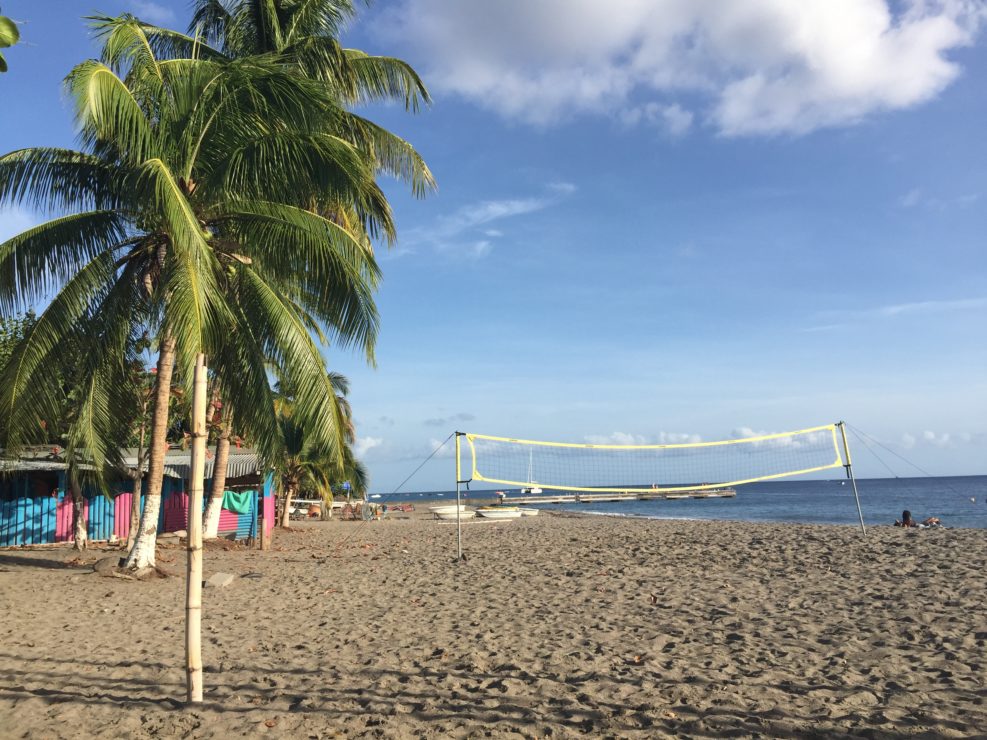
By the time I step out of baggage claim into the palm-shaded roundabout outside the terminal, sweat is pooling in the Flexfit rim of my faded Tentree hat. The last 23 hours have passed in mile-high pressurized cabins, trite security line-ups, and ghost-town waiting areas. The intense rays of Caribbean sun seem an atavistic memory. My stomach rumbles.
This trip to Martinique, an island just north of Venezuela, is my first time alone in a country where I’m not fluent in the language.
Breathe. You can do this.
A line of cabs idle at the curb. A skinny man puts my bags in the back of one, and I tell him to go to the Fort Savane.
As we drive, the calming breeze pushes a paradox of excitement-laced exhaustion further up my throat. The air smells of fresh rain and avocados. Speed limits are disregarded here; people let their seatbelts flap in the wind, and text as they drive.
“If you fail to plan, you plan to fail.” These words, said long ago by a friend through the steam of a morning tea, echo in my ears.
I’ve planned enough. I hope.
Zouk music blares from crackling speakers. Wind whistles, hotter and more dense than saliva. My sweat won’t quit. As if in one final hurrah of exhaustion, my vision dots its way into tunnels of black.
First impressions
The Fort Savane hotel is a hole in the wall. A stone’s throw from Fort-de-France Bay, it hides below a pizzeria with a massive Heineken beach umbrella across a narrow street. Banjos pound late into the night. Fiddles ring out. A few whips of charcoal escape one of the window frames. Even though you can’t smoke indoors in Martinique, there is an ashtray in the lobby.
My first thought is that the cabby has taken me to the wrong place — the hotel looks like a taller version of the boarded-up building on Richmond and Fort across from the Royal Jubilee Hospital. My heart pounds as my hands pull the handle on a tinted door. A few people mill at the curb: their elevator eyes float up, down, and up again.
One of the men is about the size of Shaq. Jet lag doesn’t dull my street sense: this guy is trouble.
“Here,” he says, and leans forward to scan a small black key fob. A lock clicks.
He jerks a thumb. “Inside.”
The narrow metal spiral staircase reminds me of something out of a prison. It’s dark, and water drips from somewhere; the lobby is vacant.
In this moment, I realize that a Caribbean four-star hotel is a generous Canadian half star. Have I just let someone scan me through death’s door? Thoughts like these are as frequent as hunger pains for someone with a fairly incessant low-to-mid-grade anxiety, but for the first time, I’m fairly certain they’re not irrational.
“In there, kid.”
The stone-faced man is behind me. His murky marble eyes beat in his skull like a pair of impish pinballs.
A woman appears, as if from nowhere. I scrunch my eyes, fighting what is rapidly approaching a sleepless 36-hour travel bender. She scans my papers and says, “There’s a leak in the roof in the room we booked you in.”
I look up, hear the water falling, and eyebrows follow my gaze.
“So we’ll move you.”
I’m checked in and given a scan-fob of my own. Trying to make heads or tails of this place, I sit beside a majestic tropical plant and dig for some darts. Shaq closes the door to the office.
“Can I grab one of those packs off you?” he says.
“What?” My voice echoes, as if I’m hearing it from someplace else. I need to sleep.
He points to the ground, where the carton of duty free cigarettes lie in a plastic bag. Fuck! On the street, coffin nails are about as valuable as sterling silver rings. Because Martinique is part of the EU, a pack still costs an hour’s work at minimum wage.

“Not a whole pack, man. C’mon.”
“You c’mon,” he says. “You have money.” His tone drops. “White guy travelling alone.”
I’m a writer and student; being broke is an axiom of the profession. But I know better than to run my mouth.
He mumbles something in Creole and retreats to the office.
There’s something off about him. My esophagus pounds. A chest hammer permeates blood and sweat through tired veins, pulverizes valour to brick dust, and doesn’t deign to let me move. I try to stand; my legs say no, not a shot in hell. Pull yourself together, you prissy old twat.
It must be comical, watching some skinny, privileged white guy who freaks out, and trembles with the novelty of reality outside a first world, liberal bubble. I pull my bag up a second spiral staircase, feeling the world lag behind each step. A blurry thought comes knocking in, like a wave in the desert: don’t piss off the guy who has the master key. I go back downstairs, put the bag down — mistake number two.
“Here,” I say, passing him a few darts from the pack in my chest pocket. “They’re Canadian.”
That’s what it takes to travel alone: careful, calm, cautious optimism.
He smiles and says, “Canada, eh?” He snatches the bag from the floor, tears open the box, and helps himself to a fresh pack.
I stare, thinking, what the fuck?
“You have lots,” he says.
I turn away. Fair enough.
To the countryside
At 10 the next morning, a van pulls up to the curb outside the hotel.
Shaq is standing outside the door, stuffing cash into his pocket and handling small dime bags. He doesn’t try to talk me up, not after last night when I shut down his invitation to hit the clubs. He came and knocked on my door, even after that stint in the lobby — I was half-sure he had come up there to smother me, leave me out in the rain for the dengue mosquitoes to feast on at sunset. But he took a hike when I told him I needed to sleep.
“Le Morne Vert?” my AirBnB host says, with a jovial smile and heavy accent.
I look back, and Shaq has disappeared. “Oui,” I say. “Ça va?”
He mutters something in French.
“Je suis désolé,” I say, climbing in the van. “No français.”
His wife is in the driver’s seat, fiddling with a dream catcher dangling from the mirror. She cuts her hand across her vision, shakes her head, as if to say, “None?”
“None,” I say, and smile. “Sorry.”
She laughs ferociously — most tourists here are from France or Montreal.
The winding drive down the narrow seaside streets is calming. You don’t have to speak someone’s language to pick up on their essence, and my AirBnB host’s is a relief after spending a night at the Savane.
I take a deep breath, looking out at the barren brown hillsides and fallow land that give way to green cloud covered hilltops. As we climb into the mountains, the air smells of fresh milk and chickens.
Late at night, when the boulevards below hum with the empty echoes of a still slumber, I imagine waking up and being happy, even settling for contentment. Waking up always reminds me of the beauty of sleep: that’s what this trip is — a break, slipping sleep away from the banalities of routine. Now, I can taste happiness, somewhere far off.
My thoughts are interrupted by hunger pains. I pull out my phone and type out an English to French translation to ask if we can stop for eggs and milk, because I’ve got to hunk up while I can.
A long walk home
The beach is a ten-minute descent from my AirBnB flat. I spent most of the next week laying in the sand, looking up at the palm trees, and ducking into Café Wahoo when it monsoons. When I get bored of swimming, sun burning, and The Snows of Kilimanjaro, a car is idling outside on the boulevard.
It’s a twenty-five-minute drive north to St. Pierre. It feels strange to be in a city again. There are no sidewalks, and cars line the roadsides. Mirrors clear mirrors by millimeters. My driver says that flashing headlights mean, ‘Get the fuck out of my way or you’re dog meat on rubber.’
She pulls off to the side, points ahead to the museum. I hand her 20 euros.
“I’ll be done in about two hours,” I say. “Any chance you can pick me up?”
She says she can. This place. Two hours.

The museum is free for the month of May in honour of the May 8, 1902 eruption of Mount Pelée, which killed about 29 000 people. It’s May 7, 2019. A chill dangles off my spine. 115 years ago, 29 000 souls had no clue they would soon suffocate beneath molten ash.
A museum employee hands me a headset, and says, “What you hear won’t align with what you see on the tour.”
“Story of my life,” I say. The museum is crowded with tourists, but it’s air-conditioned. There is black and white footage of the eruption. People point. Some cross their hearts. Barnacle-bound teacups sit behind plexiglass. Cracks and crevasses fade like sunburnt blood vessels.
When the tour is over, I wait in the beating heat. No driver comes. I hit the head to zap another litre of water, staring into the ultraviolet light like some kind of moron fascinated by science, then spend the next few days wondering why my eye sockets ache and tingle. When the happy face shows up on the StiriPen, informing me the water is drinkable, I swipe sideways on my phone in search of the app CoCo, the Uber of Martinique. I press “request” and wait. A while goes by, then, in large block sans script: “No drivers available.” By the fifth denial, my heart sinks.
Maps says a discount grocery store is a ten minute walk away. Like most students, the word “discount” entices me. I add some homemade electrolytes to the Hydroflask for the hot afternoon trek: cane sugar, salt, and lemon juice from a small mason jar.
The buildings grow withered as I walk east. A woman hangs clothes on branch after wringing them over the bucket. Hooligans loiter outside doorways. I quicken my pace. I take out my phone.
The dead battery symbol pops up. In the grocery store, the cashier shakes her head and smiles when I ask if she can call a cab.
“No cabs here,” she says in broken English. “You hitch.”
I imagine the headlines: “Canadian tourist missing on rugged Caribbean island.”
With years of a liberal, over-priced private education, I was tacitly taught never to hitchhike, not in 2019. My father’s face floats into my head, from long ago on a warm, red wine night.
“Hitchikers should have their heads examined,” he said.
I put the groceries back on the shelf. My bag needs to stay light, essentials only.
Here, a two-hour walk isn’t just a royal pain in the ass — on a 35-degree Caribbean day with limited water and wretched humidity, it is dangerous. But I’m in good shape; walking back is the lesser of two evils.
My dramatic bulldog syndrome — indicative of someone who likes to pretend situations are worse than they are to keep from getting bored — is cowering in the corner. My heart is pounding vocal chords again; the clog in my bronchial tubes is back. I tell it to get fucked. There is no need to pretend.
A lonely mile
You learn things about yourself when you travel alone. I find out that it takes roughly 30 days in seclusion before the black dog of depression curls up on the threshold of my mind.
It takes roughly 10 litres of water to stay hydrated in the Martinique heat, especially when walking to save money on cabs. Within half an hour, I’m through one of two water bottles.
I’m a microscopic spec in a colossal sea. It occurs to me that I’m in shark territory.
My throat is itching, and hunger is making me weak. I’m starting to feel dizzy, light a smoke in hopes that will help. Obviously, it doesn’t. The roadway is narrowing. There’s about a foot and a half between me and cars bolting by at 100 clicks.
I suddenly understand that it doesn’t take an error in judgement or a lack of common sense to get into trouble when you’re travelling. I stop on a gravel shoulder and stare out at the round green hilltops, their tips covered in misty cloud.
Think. Cabs are a no-go. The narrow road and my increasing exhaustion makes asking a kind local for a ride the only option.
I kill my dart underfoot, and cross the road to where a van is parked. A man is sitting in the van, eating his lunch, and it’s clear he doesn’t speak a word of English. I hold my thump up, smile, and point down the road.
When he smiles back, the genuine kindness in his eyes makes me want to do a little dance of luck. As I get into the passenger side, fully aware that I’m putting my fate in the hands of a complete stranger, I promise never to ask for anything but essentials, ever again, and to always smile.
Sharks, dolphins, and tuna
The next few days are spent hunkered down in the safety of my studio. Beneath the sour sop and mango trees, I read Hunter S. Thompson’s account of the Hell’s Angels, cook fresh red snapper for dinner, and listen to the crickets chip their nighttime orchestra in the depths of the Calabash trees. Bats bolt from branch to branch. Rats scurry across the steel fence that encases the property.
On a few nights, silent heat lightning illuminates palm tree shadows across the boulevard. The neighbour plays piano at sunset: Mozart, Elton John, a few 30’s speakeasy tunes.
The supplies in my fridge are quickly running low. Each day, I walk 20 minutes up the hill to a small grocery store. Each day it is closed. On Thursday, I wait outside for an hour. It’s noon: why is a store closed at noon in the middle of the week, I wonder. I wait more. The church bells strike 2 pm. It doesn’t open. By Friday, there are two eggs left, a bit of stale bread, and as much fruit as I want from the garden. Dinner that night is a cup of milk, a bite of hard bread, a mango, and and a cup of milk half full of olive oil for some calories. I’m surprised by how long the olive oil curbs the hunger.
I fall asleep early to an audiobook recording of The Rum Diary. The sound of the readers voice helps me not to think.
The chickens next door wake me the next morning. I finish the last egg, and start the trek to the grocery store, hoping it isn’t all for nothing.
As I walk, a goat lays in the shade of a hurricane drain. I catch her beady black eyes. They stare as I walk by, careful and calm. That’s what it takes to travel alone: careful, calm, cautious optimism.
I damn near buckle right there in the town square. The rusty tin door of the store is pulled open on the verandah. People mill in the doorway, picking out cucumbers and carrots from plastic milk crates.
Once I’ve got my fridge safely stocked, there’s a hop in my step. I book a dolphin-watching tour for the next morning.

It’s a relief to see other people again, even if I can’t understand as they talk and laugh, and smile. When they do, I smile, too. It’s the universal language. After so long stuck in my own head, just listening is a joyous activity. One of the other tourists, an organic chemist from mainland France, tells me about the PhD thesis that waits for him in Paris. I know fuck all about organic chemistry, so I do the age-old nod along.
He’s cut off mid-sentence by a frantic yell. The Boston Whaler sways as people plow to the port side of the boat.
Dark gray fins pierce out of the water. A dolphin jumps high in the air, twirling, turning with gravity, and plummets back into the sea.
After the dolphins get bored, we pull into a small bay. Snorkels are passed around. I’m not a strong swimmer, and have an irrational fear of swimming in the ocean.
But anyone who travels across the world to be governed by their fear should stay on the plane and go back to where they came from. After all this, I know that much.
The water is calm. Outlines of the sun shine in diamond-shaped rainbows on the sea floor. Water leaks into my mask; I fight the undertow, spreading my fingers, plowing through the twirling tide with no elegance whatsoever, to where severed landscape meets the white foam of breaking tropical surf. The rockface looks as though it’s been severed from the earth in one colossal shock..
Below the surface, it is quiet. Far off, a propeller hums. A Moorish idol, small crabs, and minnows linger in the warm surf, darting from ray to ray as if sunlight is nature’s bait.
I’m a microscopic spec in a colossal sea. It occurs to me that I’m in shark territory.
“Oh, shut it,” I say to myself. Instead, I make myself think of the fresh pineapple and salted albacore sandwich that’s cooling on a bed of ice, waiting for me on board the Whaler.
Through the tube of the snorkel, my voice is a dull echo. “You’re fine.” I say this over and over again until I’m home.






